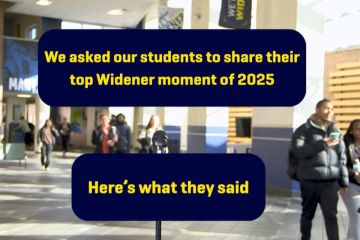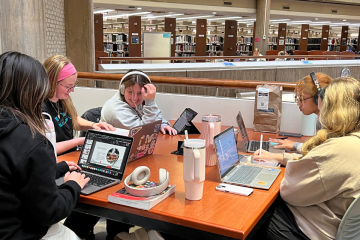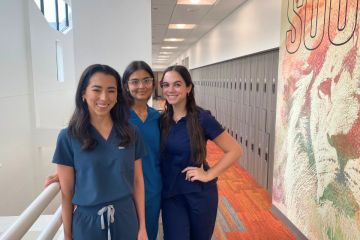Preparing Tomorrow’s Special Education Teachers Today

Alyssa Lesher sits in front of a brightly-lit, colorful classroom, her five students form a semi-circle around her.
It’s time to sing songs, and each student gets to decide what the class will sing next. Lesher, a 2018 Widener graduate, presents each child two picture cards representing their choices.
The cards help the non-verbal youngsters communicate. Lesher’s students have complex needs; some are wheelchair-bound or unable to walk on their own. There are monitors to keep an eye on, and three classroom assistants help provide the students with nearly one-on-one attention.
“I love working with the kids. It’s inspiring,” says Lesher, who exudes calmness as she checks on a student’s beeping monitor. “These kids rely on you.”
Lesher has been a special education teacher here, at the private Elwyn Davidson School in Delaware County, since January 2019. Her path to this classroom is rooted directly in her field experiences while at Widener. As a psychology major, she interned at Elwyn, which led to her being hired as a teacher assistant, and later as a full-time teacher.
Today, Lesher is back at Widener part-time to pursue her certification and master’s degree in special education. Strong support from her faculty advisors and the program’s breadth of courses are offering her “the whole picture of special education.”
Widener’s special education program – at both the undergraduate and graduate levels – provides aspiring and practicing teachers like Lesher with the tools they need to find success in this ever-evolving field. New research and approaches, early intervention, more specific diagnoses, and the increased inclusion of special needs students in typical classrooms have all led to growth in the special education field.
“There is definitely a demand,” said Assistant Professor Essence Allen-Presley, coordinator of Widener’s special education program. “Autism, for instance, has become highly specialized, relying on teachers to think outside the box.”
The goal of the special education program is to provide Widener students with an extensive knowledge base. Courses, for instance, also address gifted education, which falls under the umbrella of special ed.
Field placements expose students to both special education-specific classrooms, as well as inclusive general education classrooms. And placements include a mix of public and private, urban and suburban school settings.
Special education is not a fixed science. We can prepare (education majors) as much as possible, but kids are unique. You go into an unknown each and every day. So we prepare our students with a level of autonomy with their thinking – getting them to think differently, to draw on creativity, to use technology. — Assistant Professor Essence Allen-Presley
Special education majors have at least five placements – often more – during their time at Widener, as they jump into their field work immediately. During their first year, students spend time at the Widener Child Development Center, working with pre-school and kindergarten-aged children. Sophomore year, students gain experience at the Widener Partnership Charter School.
By junior year, students are in field placements at schools around the region where they experience more defined diagnosis settings. In their final year, students spend a semester in the Community Engaged Teacher Education (CETE) program at neighboring Stetser Elementary, followed by a semester of student teaching, providing them a full year of experience in an inclusive environment.
Senior early childhood/special education major Ainsley Feyock’s interest in this field is personal. Born with cerebral palsy, she “learned to advocate for myself and it’s helped me be a better advocate for others.”
One of Feyock’s field placements has been right on campus, through Widener’s inclusive higher education program. Beginning in 2018-19, three adult students with intellectual disabilities enrolled in the one-year certification program. The program provides students with an opportunity to be immersed in an authentic college experience and to participate in traditional academic and social activities.
Feyock served as a peer mentor for the students. She observed their classes, offered them strategies for note-taking, helped them navigate technology, and engaged them on campus socially.
“I helped them advocate for themselves in class, and I’ve seen them make tremendous strides and impressive gains,” said Feyock.
With these experiences under her belt, Feyock feels “very well prepared” to embark on her teaching career – whether she lands in a general education or a special education classroom after graduation.
“Even if you’re teaching general education, you will have students with IEPs (Individualized Education Programs),” said Feyock. You’ll need to adapt lesson plans and be flexible. So it’s good to be prepared with a background in both.”



